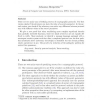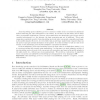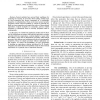82 search results - page 5 / 17 » Deciding knowledge properties of security protocols |
ASM
2008
ASM
13 years 11 months ago
2008
ASM
We address the proof-based development of cryptographic protocols satisfying security properties. Communication channels are supposed to be unsafe. Analysing cryptographic protocol...
ENTCS
2006
13 years 9 months ago
2006
There are two main ways of defining secrecy of cryptographic protocols. The first version checks if the adversary can learn the value of a secret parameter. In the second version,...
ENTCS
2006
13 years 9 months ago
2006
The AVISPA Tool is a push-button tool for the Automated Validation of Internet Security Protocols and Applications. It provides a modular and expressive formal language for specif...
IACR
2011
12 years 9 months ago
2011
A zero-knowledge protocol allows a prover to convince a verifier of the correctness of a statement without disclosing any other information to the verifier. It is a basic tool a...
CSFW
2009
IEEE
14 years 4 months ago
2009
IEEE
—Formal methods have proved their usefulness for analyzing the security of protocols. Most existing results focus on trace properties like secrecy (expressed as a reachability pr...



